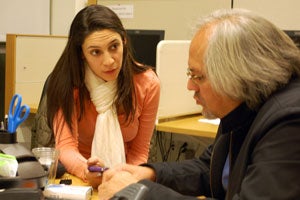Last month, as an historic trial continued in Guatemala against a former dictator charged with the genocide of indigenous Mayans, Lauren Herman ’13—a student in the Harvard Immigration and Refugee Clinic (HIRC) —stood in court in Boston as a judge announced he was granting asylum to her Mayan client, who, with his family, had suffered persecution for decades before he came to the U.S. in 2009.
“I think it was the most meaningful thing I’ve done in law school,” says Herman, who, under the guidance of John Willshire Carrera, co-managing director of HIRC at Greater Boston Legal Services (GBLS) and an expert in asylum work, helped prepare the client to testify about the abuse he and his family endured in Guatemala, and the danger he would face should he be forced to return. “It felt like an awesome responsibility that he put his faith in us that we could help him tell his story,” says Herman.
For Willshire Carrera, who holds a joint appointment with HIRC and GBLS and has instructed hundreds of Harvard Law students in immigration and refugee work, the case marked the 35th or so successful asylum petition by the clinic on behalf of Mayans from Guatemala since 2007, when a large group was arrested in a raid by federal officials at a textile factory in New Bedford, Mass. In the highly controversial raid, 361 undocumented immigrants—mostly women—from El Salvador, Honduras, Guatemala, and other places were picked up by Immigration and Customs Enforcement, with about 230 immediately transported to detention centers in Texas over the objections of a team of lawyers led by Willshire Carrera and Nancy Kelly, the co-managing director of HIRC at GBLS. The team flew to Texas and was able to get most of the cases and clients returned to Massachusetts, to be reunited with their families and community, but others had already waived their rights and were deported, despite having valid asylum claims, Kelly says.
In the six years since, due to the dedication and legal acumen of Willshire Carrera and Kelly, and HLS clinical students, a significant percentage of Mayans arrested in the raid have been granted asylum and allowed to stay in the U.S. The clinic represents another 40 or so Mayan clients whose asylum petitions, they feel, are equally legitimate. In the beginning, federal officials insisted the Mayans had no substantive right to be here, recalls Kelly. But through presenting testimony of experts and the clients themselves, the clinic has been a national leader in educating immigration judges about the political history of Guatemala, including that Mayans continue to be persecuted to this day. “This is a group of people who have very strong claims for asylum and other forms of relief,” Kelly says.
Meanwhile, in March, the high-profile trial began in Guatemala against former head of state General José Efrain Ríos Montt and his former head of military intelligence, General Mauricio Rodríguez Sánchez, on charges of ordering the murders of more than 1,700 Ixil Mayans in the 1980s. More than 100 witnesses and experts testified against the two men, describing horrific instances of rape, torture, and murder of children, women and men. According to the U.N., the case marks the first time in history that a former head of state has been tried for genocide by a national tribunal (international judges presided over trials related to the genocides in Rwanda and the former Yugoslavia). But, as of late April, the fate of the Ríos Montt case was uncertain after a judge moved to start the trial over again from the beginning, despite vigorous protests by human rights groups from around the world.
For HLS students, the cases of the indigenous Guatemalans offer “a unique experience with asylum cases,” says Phil Torrey, a clinical instructor in HIRC and supervising attorney of the Harvard Immigration Project. Since a peace accord was forged in 1996, formally ending the Guatemalan civil war between the indigenous population and the government, the presumption has been that Mayans are no longer in danger, when, in fact, persecution continues. “This teaches students not to dismiss a case at face value, not to simply say, ‘The war in Guatemala is over, and that’s the end of it,’” agrees Kelly. “The legacy of the war continues, as you can see in the [Ríos Montt] trial.”
The clinical students spend long hours with clients eliciting their often-painful personal stories, to support claims for asylum, prepare clients to testify, interview expert witnesses, draft affidavits, and sometimes conduct examinations of their clients or others in hearings. They also connect their clients to mental-health services, since so many of them suffer from PTSD. “The students have done a great job, and the success rate has been fantastic,” says Torrey. “It’s really encouraging.”
Nikki Flores ’11, who is currently working as a law clerk for a federal court in Chicago, will be working next year in the Office of Chief Counsel of the U.S. Citizenship and Immigration Services in Chicago. Her former client, very active politically in Guatemala, fled to the U.S. after severe persecution, and settled in New Bedford. Though not arrested in the Bianco raid, he was prompted by it to seek asylum, and found his way to the Harvard clinic. Though many of the Mayan clients speak only K’iche’, both Flores and her client speak Spanish, and she helped him draft his affidavit and prepare his testimony, and she accompanied him to the hearing, which, she says, “was a really emotional event for everybody, especially him.” When his petition was granted, she adds, “It was definitely one of the highlights of my HLS experience.”
The clinic provided invaluable professional experience, she says. “Having an intimate understanding of asylum law and getting to work through the process will help me in my future job,” she says, “as will understanding that there are these cultural differences that can make an impact in terms of credibility or the decisions that people make.”
